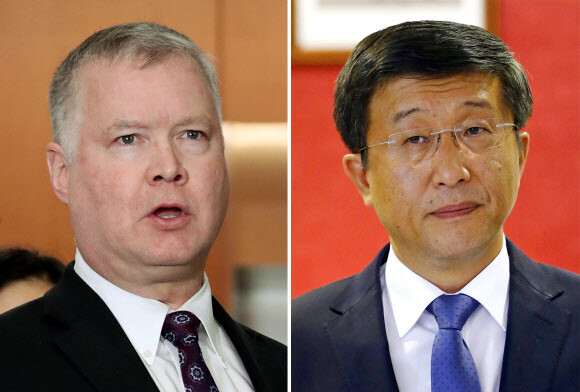hankyoreh
Links to other country sites 다른 나라 사이트 링크
Biegun arrives in Pyongyang for working-level discussions with Kim Hyok-chol

On Feb. 6, US State Department Special Representative for North Korea Stephen Biegun arrived in Pyongyang for talks with Kim Hyok-chol, his North Korean counterpart and North Korea’s former ambassador to Spain, that are aimed at setting the agenda for the second North Korea-US summit. Since these working-level talks are taking place shortly after US President Donald Trump announced during his State of the Union address on Wednesday that the summit will be taking place in Vietnam from Feb. 27 to 28, they’re expected to involve an in-depth discussion of the agenda.
Biegun had visited Pyongyang previously with US Secretary of State Mike Pompeo in Oct. 2018, just over three months ago, but this is his first trip to North Korea in which he’d heading up the US delegation to the talks. Kim Hyok-chol emerged as Biegun’s new dialogue partner during the visit to Washington, DC, on Jan. 18 by Kim Yong-chol, vice chairman of the Workers’ Party of Korea (WPK). In effect, this meeting marks the official beginning of the working-level negotiations led by Biegun and Kim Hyok-chol.
During these working-level negotiations, Biegun and Kim are expected to focus on arranging the agenda for the second summit. The critical mission here is to find a balance between the steps that North Korea takes toward denuclearization, including the shutdown of its Yongbyon nuclear facilities, and the corresponding measures offered by the US. During a lecture at Stanford University on Jan. 31, Biegun observed that North Korean leader Kim Jong-un had promised to shut down the North’s plutonium and uranium enrichment facilities provided that the US provides corresponding measures and said that those corresponding measures would be discussed during the working-level talks. Some of the possible corresponding measures that have been mentioned are an end-of-war declaration, the establishment of a liaison office and the expansion of humanitarian aid.

US seeming accepts inevitability of step-by-step approach
In addition to these measures, North Korea is asking for sanctions to be eased, and the US’ response to this request is likely to decide the fate of the working-level talks. During his speech, Biegun said that “we will not lift sanctions until denuclearization is complete” but added that “we didn’t say we won’t do anything until you [North Korea] do everything.” This can be taken as implying that some sanctions could be eased, depending on the circumstances. The US has reportedly been offering an economic cooperation package that would guarantee a bright future for North Korea after its denuclearization.
Another big question is whether these working-level negotiations will develop into a roadmap linking North Korea’s steps toward denuclearization with the US’ corresponding measures. Biegun has suggested that the overall process could proceed as follows: dismantling the Yongbyon nuclear facility, dismantling the rest of the North’s nuclear facilities, and eliminating its nuclear arsenal. While Biegun noted that a comprehensive disclosure and verification of nuclear sites would be necessary at some point, he didn’t insist on that had to be the starting point of denuclearization, which indicates that the US has accepted the inevitability of a step-by-step approach grounded in confidence-building.
The fact that Biegun is making a public trip to Pyongyang is taken by some as a signal that North Korea and the US have achieved progress in their preceding negotiations. Considering the inconvenience inherent in conducting negotiations in Pyongyang, a city without an US diplomatic mission, experts believe that Biegun has been given considerable discretion in the working-level negotiations. From North Korea’s perspective, Kim Jong-un’s opinions can be promptly reflected in the negotiations.
“Biegun is apparently trying to not only hold working-level negotiations but also to ascertain the motivations of Kim Yong-chol as well as Kim Jong-un himself. If Biegun makes an unconventional offer, he’ll need North Korea’s leadership to be on board in order to get an answer,” said Cho Sung-ryul, a senior research fellow for the Institute for National Security Strategy.
Biegun’s itinerary not made public
Biegun’s itinerary in Pyongyang has yet to be made public. It hasn’t even been announced whether he’ll be meeting any other senior North Korean officials other than Kim Hyok-chol. It doesn’t appear that Biegun intended to rush through the negotiations and then return on Feb. 6 or the morning of Feb. 7. Though diplomatic conventions argue against Biegun meeting with Kim, a surprise meeting between the two isn’t inconceivable, depending on how the working-level negotiations turn out.
Summit protocol deliberation between Kim Chang-son and White House staff
Biegun flew into North Korea using the direct route over the West Sea (Yellow Sea), arriving at Pyongyang International Airport at 10 am on Feb. 6. While in Seoul from Feb. 3 to 4, Biegun discussed his strategy in the working-level talks during meetings with Chung Eui-yong, director of the Blue House National Security Office, and Lee Do-hoon, special representative for Korean Peninsula peace and security affairs.
Whereas Biegun and Kim Hyok-chol are responsible for arranging the agenda of the second summit, the logistical planning for the summit, including protocol and security, is likely to be tackled by secretarial staff in the White House and by Kim Jong-un’s de facto chief of staff Kim Chang-son. Leading up to the first summit, US Ambassador to the Philippines Song Kim and North Korean Vice Foreign Minister Choe Son-hui arranged the agenda at Panmunjom while Kim Chang-son and then White House Deputy Chief of Staff Joe Hagin discussed protocol and security matters on the ground in Singapore.
Another item of interest is the role that will be played by Kim Yo-jong, Kim Jong-un’s younger sister and the first vice director of the WPK Propaganda and Agitation Department. Considering that Kim Yo-jong has accompanied Kim Jong-un to major meetings overseas, including the first North Korea-US summit, she’s once again expected to work with Kim Chang-son on deciding Kim Jong-un’s itinerary.
By Yoo Kang-moon, senior staff writer, and Noh Ji-won, staff reporter
Please direct comments or questions to [english@hani.co.kr]

Editorial・opinion
![[Column] Has Korea, too, crossed the Rubicon on China? [Column] Has Korea, too, crossed the Rubicon on China?](https://flexible.img.hani.co.kr/flexible/normal/500/300/imgdb/original/2024/0419/9317135153409185.jpg) [Column] Has Korea, too, crossed the Rubicon on China?
[Column] Has Korea, too, crossed the Rubicon on China?![[Correspondent’s column] In Japan’s alliance with US, echoes of its past alliances with UK [Correspondent’s column] In Japan’s alliance with US, echoes of its past alliances with UK](https://flexible.img.hani.co.kr/flexible/normal/500/300/imgdb/original/2024/0419/2317135166563519.jpg) [Correspondent’s column] In Japan’s alliance with US, echoes of its past alliances with UK
[Correspondent’s column] In Japan’s alliance with US, echoes of its past alliances with UK- [Editorial] Does Yoon think the Korean public is wrong?
- [Editorial] As it bolsters its alliance with US, Japan must be accountable for past
- [Guest essay] Amending the Constitution is Yoon’s key to leaving office in public’s good graces
- [Editorial] 10 years on, lessons of Sewol tragedy must never be forgotten
- [Column] A death blow to Korea’s prosecutor politics
- [Correspondent’s column] The US and the end of Japanese pacifism
- [Guest essay] How Korea turned its trainee doctors into monsters
- [Guest essay] As someone who helped forge Seoul-Moscow ties, their status today troubles me
Most viewed articles
- 1[Column] The clock is ticking for Korea’s first lady
- 2Samsung barricades office as unionized workers strike for better conditions
- 3[Correspondent’s column] In Japan’s alliance with US, echoes of its past alliances with UK
- 4After 2 months of delayed, denied medical care, Koreans worry worst may be yet to come
- 5[Column] Has Korea, too, crossed the Rubicon on China?
- 6Hong Se-hwa, voice for tolerance whose memoir of exile touched a chord, dies at 76
- 7US overtakes China as Korea’s top export market, prompting trade sanction jitters
- 8All eyes on Xiaomi after it pulls off EV that Apple couldn’t
- 9[Photo] Smile ambassador, you’re on camera
- 10[News analysis] After elections, prosecutorial reform will likely make legislative agenda